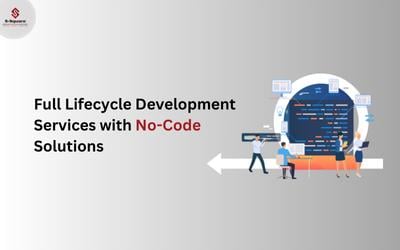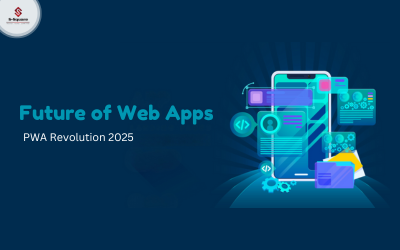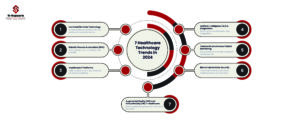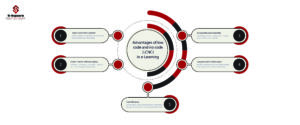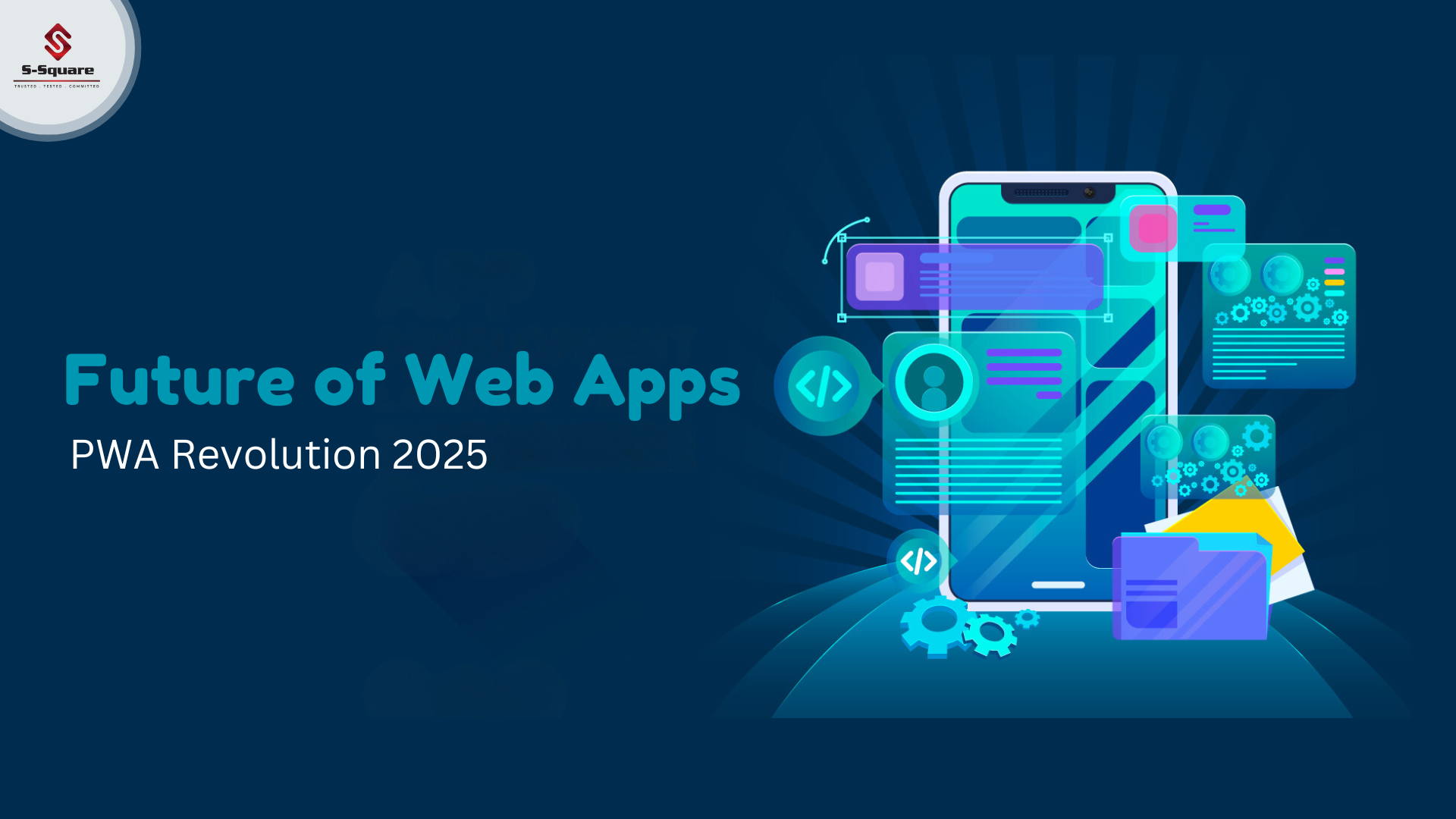
Introduction: The Digital Shift to PWAs.
The digital world is always evolving to fulfil user demands for faster, more dependable, more accessible experiences. Progressive Web Apps (PWAs) are at the vanguard of this revolution, effortlessly combining the benefits of websites and mobile apps. They offer businesses a cost-effective solution while providing users with an exceptional experience.
By 2025, Progressive Web Apps (PWAs) are predicted to become the top choice for digital interaction, setting new standards for performance, flexibility, and growth. Companies that start using PWAs now are preparing to stay ahead of their competition and meet the needs of a tech-savvy audience.
Understanding Progressive Web Apps (PWAs): A New Era of Functionality
Progressive web apps are more than just a trendy term—they represent a big change in how apps are designed and used. Even though they run on the web, these apps can do things like work offline, send push notifications, and feel as fast and smooth as apps you download to your phone.
PWAs use advanced tools like web app manifests and service workers, to create a smooth, reliable, and engaging experience for users.
Key Trends Elevating Progressive Web Apps (PWAs) in 2025
Offline Functionality: Serving Users Anytime, Anywhere
One of the most compelling features of Progressive Web Apps (PWAs) is their ability to function seamlessly without an internet connection. Powered by service workers who cache essential content, PWAs ensure uninterrupted access to critical information even in low-connectivity or offline scenarios.
This capability isn’t just a convenience—it’s a game-changer for industries and professionals working in challenging environments. For instance, field workers such as maintenance technicians, city or county repair personnel, and energy workers often operate in remote or underdeveloped areas with unreliable internet access. PWAs provide them with the tools they need, from accessing operational data and manuals to updating task lists in real time once reconnected.
Beyond fieldwork, industries like e-commerce, media, and travel also harness offline functionality to create superior user experiences. Customers can browse products, read news, or review itineraries without interruptions, ensuring satisfaction regardless of their location or connectivity.
By catering to both workforce efficiency and customer convenience, PWAs redefine accessibility, making them indispensable for the fast-paced, digitally driven world of 2025.
The Rise of Cross-Platform Development
Creating separate apps for iOS, Android, and desktop is a thing of the past. PWAs allow developers to use one codebase that works well on all devices. It makes development faster and ensures that users get the same experience no matter what device they are using.
Push Notifications for Personalized Engagement
Push notifications are transforming customer retention strategies. PWAs will enable companies to deliver timely and relevant updates to users directly, thereby increasing the engagement of the user and thus strengthening the connection between the brands and consumers.
The Mobile-First Revolution and PWAs
Progressive Web Apps (PWAs) are made to be mobile-first, guaranteeing quick load times, simple navigation, and optimised layouts, considering the continued dominance of mobile usage. For companies looking to draw in and hold on to mobile users, this strategy is essential.
Security Enhancements for User Trust
Since cyber threats are rising, PWAs have HTTPS protocols, which offer safe data transfer. This gives an assurance of safety, making the application worthy for the trust of users in cases of e-commerce and financial platforms.
How Progressive Web Apps Empower Businesses?
Enhanced Performance That Drives Results
PWAs are designed to be quick. One important indicator for online businesses is bounce rates, which are decreased by faster loads. PWAs guarantee that customers stay longer, interact more, and convert more effectively since performance optimisation is ingrained in their architecture.
Broader Reach with Lower Development Costs
Traditional app development is more expensive because it requires making several versions for different platforms. By providing a uniform solution that functions flawlessly across devices, Progressive Web Apps (PWAs) remove this redundancy and allow organisations to reach a larger audience without going over budget.
App-Like Experience Without Downloads
Progressive Web Apps (PWAs) don’t require consumers to go to an app store in order to download them, unlike native apps. They may be installed straight from a web browser, which streamlines and expedites the process. More people download and utilise the app as a result of its convenience.
Unparalleled Accessibility
Whether it’s a busy metropolis with fast internet or a distant location with a slow internet, PWAs will ensure users get access to vital services and content without a problem. Lightweight architecture makes PWAs suitable for any user irrespective of bandwidth conditions.
Industries Leading the Progressive Web Apps (PWAs) Adoption Movement
E-Commerce: Revolutionizing Online Shopping
PWAs are revolutionising e-commerce by providing customised shopping options and quicker load times. By switching to PWAs, companies like Flipkart and Alibaba have claimed higher engagement and conversion rates.
Media and News Platforms: Keeping Readers Engaged
For media companies, speed and accessibility are of utmost importance. PWAs such as Forbes provide readers with instant access to news, even in areas with poor internet connectivity, thus fostering better engagement.
Hospitality and Travel: Enhancing Customer Journeys
From booking hotels to planning trips, Progressive Web Apps (PWAs) make the customer journey easier. By providing offline access to itineraries and real-time updates, they ensure that travellers are always informed.
Education and E-Learning
As online learning is increasing, Progressive Web Apps (PWAs) become a foundation for educational platforms. They enable learners to access the content even in offline mode so that learning continues uninterruptedly.
Technologies Powering the Progressive Web Apps (PWAs) Ecosystem
Service Workers: The Backbone of Offline Capabilities
A service worker is a script running in the background of an app independent of the application. It introduces features such as off-line caching, background sync, and push notifications, thereby making the web app work well even when disconnected.
Web App Manifest: Crafting the App’s Identity
The web app manifest is a JSON file that provides some metadata about an app. Through it, a definition of an app’s display to users starts from its icon to its splash screen, setting a polished, professional look on it.
Responsive Design: Adapting to Every Screen
PWAs take the responsive design principles to guarantee their adaptation and fit into whatever screen size users are using with them.
Real-World Success Stories of Progressive Web Apps (PWAs)
Pinterest: Enhancing User Engagement
Pinterest developed a PWA that made the experience of mobile web users better and hence increased time spent on the site and generated higher user-generated ad revenue.
Trivago: Simplifying Travel Search
The hotel search platform Trivago designed a PWA that would improve users’ fast and reliable mobile experience. Results included a very high improvement of page load time and user engagement.
Tinder: Simplifying Online Dating
Tinder, the world’s largest dating platform, has transformed its mobile user experience with a Progressive Web Application (PWA), called Tinder Online. Designed for users who may not have reliable connectivity in certain regions or who are running on devices that have limited storage, the PWA is an alternative to the native app.
With Tinder Online, users experience faster load times, seamless navigation, and reduced data consumption, making online dating more accessible than ever. Through PWA technology, Tinder has expanded its reach, allowing millions to connect without the constraints of app downloads or heavy internet usage.
Uber: Transforming Ride-Hailing with a PWA
As part of its aim to offer an impeccable booking experience irrespective of the network conditions, Uber, one of the pioneering ride-hailing companies globally, rolled out its Progressive Web App (PWA), m.uber. The PWA was designed to be suitable for devices with less storage space and low-bandwidth connections, thereby ensuring access to everyone.
Even on 2G networks, the PWA is lightweight in design so that it would load within less than three seconds, coupled with other features such as safe payment methods, real-time updates, and easy navigation. Millions of customers can now easily book rides without installing the native application, because of the PWA offered by Uber, which has led to greater penetration into new countries.
What Makes 2025 a Crucial Year for Progressive Web Apps (PWAs)?
The technological landscape is also ripe for PWAs to take centre stage with the advancement in AI, machine learning, and IoT. PWAs also integrate smarter features that offer personalization with AI and ML advancements. The 5G footprint that is sure to cover every populace also stands to amplify their performance, with near-instant load times and smoother interactions.
How S-Square Can Transform Your Progressive Web App (PWA) Strategy
The right partner will be crucial as businesses try to tap into the potential of PWAs. S-Square has unmatched expertise in PWA development, crafting solutions tailored to your specific industry needs.
Tailored Development Solutions
We understand that each business is unique. S-Square creates tailored PWAs (Progressive Web Apps) that achieve the greatest results.
Seamless Integration and Migration
Whether you’re beginning from scratch or transitioning from an existing system, S-Square simplifies the migration process and ensures that your business works smoothly.
Ongoing Support and Optimization
Our commitment doesn’t end with deployment. S-Square provides continuous support and optimization to keep your PWA ahead of the curve.
Conclusion
The future is here, and everything revolves on growth. Progressive Web Apps (PWAs) are altering the way organisations interact with their customers, providing cost savings, improved performance, and more engagement. PWAs are more than simply a technology; they represent a winning approach for success in 2025 and beyond.
S-Square’s skills in PWA development help your business make the most of this game-changing technology. Whether you want to create something new or improve what you already have, S-Square is the right partner to guide you into the future of digital innovation.
Frequently Asked Questions
What makes Progressive Web Apps different from traditional websites?
PWAs connect the strengths of websites and native mobile apps: access to offline functionality, faster performance, and a more interactive experience.
How do Progressive Web Apps (PWAs) support offline functionality?
They use something called service workers, that cache essential data. This allows users to view content even when they’re not connected to the internet.
Which industries can benefit the most from PWAs?
Industries like online shopping, news, travel, and education benefit a lot from PWAs because they’re easy to access, fast, and cost-effective.
Are Progressive Web Apps suitable for small businesses?
Absolutely. PWAs are cost-effective, easy to maintain, and offer small businesses a competitive edge in reaching broader audiences.
How can S-Square assist in building a successful PWA?
S-Square provides end-to-end PWA solutions, from custom development to SEO-friendly optimization, ensuring your business achieves its digital goals.





